The Unhealthiest Bottled Drinks on the Planet
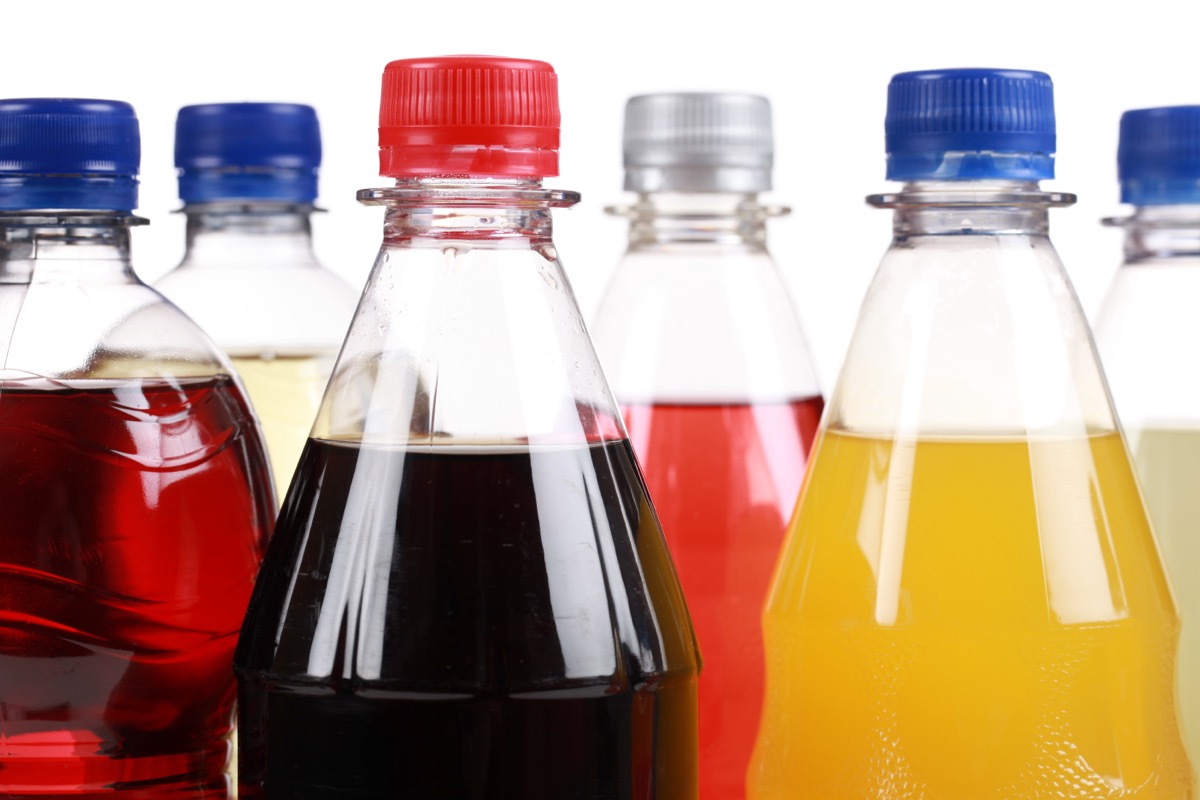
Water is the most effective and healthiest way to hydrate, but sometimes you’re craving something more. While juice, protein shakes and other convenient bottled drinks are easy to grab and seem like they’d quench your thirst, don’t be fooled. Many are unhealthier than you think and contain more sugar than is recommended in a day.
According to the American Heart Association, men should not consume more than 9 teaspoons (36 grams or 150 calories) of added sugar daily, while women should not consume more than 6 teaspoons (25 grams or 100 calories) daily, and some bottled drinks have too much sugar per the guidelines.
There’s so many options when it comes to bottled drinks, but to help you learn which ones to steer clear of, Eat This, Not That! spoke with Mary Sabat MS, RDN, LD who reveals the top seven unhealthiest choices ranked from bad to worst.
Gatorade Zero
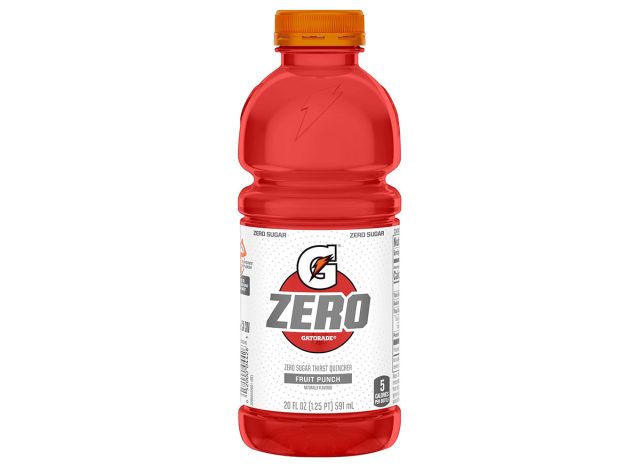
Calories: 5
Fat: 0g (Saturated fat: 0g)
Sodium: 260mg
Carbs: 1g (Fiber: 0g , Sugar: 0g)
Protein: 0g
Gatorade Zero looks like a healthy choice because it’s super low in calories and doesn’t have sugar, but read the label and you’ll see why Sabat says to avoid this drink.
“While Gatorade Zero skips the sugar, it trades one problem for another by loading up on artificial sweeteners and chemical additives,” she says.
“It contains both sucralose and acesulfame potassium—two synthetic sweeteners linked to gut microbiome disruption, glucose intolerance, and possible carcinogenic effects in animal studies.”
The drink also contains alarming ingredients.
“The artificial coloring Red 40 remains in the formula, a petroleum-based dye associated with hyperactivity and behavioral issues in children, and potential genotoxicity,” Sabat points out.
“Other additives like glycerol ester of rosin and modified food starch serve no nutritional benefit and may irritate sensitive digestive systems,” she adds. “With zero protein, fiber, or micronutrient value, Gatorade Zero delivers no real nourishment—just a cocktail of chemicals that may be even more harmful long-term than the original sugar-filled version.”
Muscle Milk
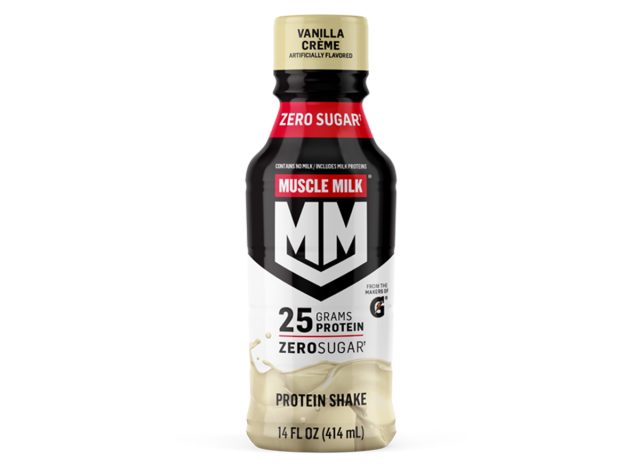
Calories: 160
Fat: 4.5g (Saturated fat: 1g)
Sodium: 210mg
Carbs:8 g (Fiber: 6g , Sugar: 0g)
Protein: 25g
Muscle Milk seems relatively healthy, especially since there’s no sugar, but according to Sabat it’s one of the worst because of the ingredients.
“Muscle Milk may boast 25 grams of protein per bottle, but the health trade-offs are significant. It relies on conventional, highly processed dairy proteins like milk protein isolate and calcium caseinate, which lack the nutrient profile of whole or grass-fed dairy,” she says.
Sabat explains, “The formula includes high oleic sunflower oil—a refined seed oil that may contribute to inflammation—along with both natural and artificial flavors, which can mask a long list of unlisted chemicals. The inclusion of carrageenan raises concerns due to its link to gut irritation and inflammation.”
In addition, Sabat states, “the most alarming are the artificial sweeteners sucralose and acesulfame potassium, both associated with gut microbiome disruption and potential carcinogenic effects in lab studies. While the protein count is high, consuming this chemical cocktail regularly may pose greater risks to long-term health than the benefits of convenient protein intake.”
Fairlife Chocolate Milk
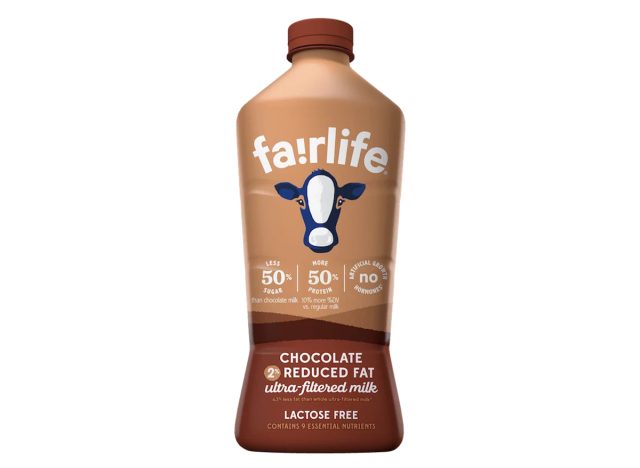
Calories: 140
Fat: 4.5g (Saturated fat: 3g)
Sodium: 280mg
Carbs: 13g (Fiber: 1g , Sugar: 12g)
Protein: 13g
Fairlife Chocolate Milk has 13 grams of protein per serving and is advertised as a healthy milk option, but Sabat warns to skip this drink.
“Sticking with my pet peeve against this company, their milk products are also poor quality food items,” she says.
“Fairlife Chocolate Milk is often marketed as a high-protein, “better-for-you” beverage, but its ingredient list tells a different story. It starts with non-organic, ultra-filtered milk, which lacks the nutritional benefits of grass-fed dairy and may contain hormone or antibiotic residues,” she states.
The ingredients are also worrisome for Sabat.
“The second ingredient is sugar—followed by artificial sweeteners like sucralose and acesulfame potassium, both linked to gut dysbiosis and potential long-term health risks, including increased cancer risk in animal studies”
She explains, “Carrageenan is another red flag, a common additive associated with gut inflammation and digestive issues. Adding “natural and artificial flavors” further obscures what’s actually in the drink, as these can include dozens of unlisted chemical compounds.”
Sabat says, “this drink comes at the cost of exposing the body to highly processed additives that undermine gut health and overall well-being. This is far from a clean, healthy snack despite its convenient packaging.”
Gatorade Thirst Quencher (Fruit Punch)
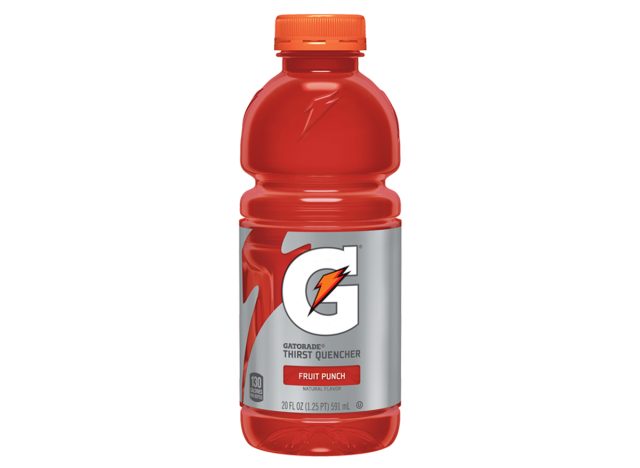
Calories: 140
Fat: 0g (Saturated fat: 0g)
Sodium: 270mg
Carbs: g (Fiber: 0g , Sugar: 34g)
Protein:0 g
When you’re really hot and need to cool down, nothing seems to do the trick like Gatorade Thirst Quencher (Fruit Punch), but Sabat doesn’t recommend the popular drink.
“Gatorade Thirst Quencher may be marketed as a hydration aid for athletes, but for most people, it’s little more than sugar water with added chemicals.,” she says.
“With 34 grams of added sugar per bottle—nearly 70% of the daily recommended limit—it causes rapid blood sugar spikes and contributes to inflammation, weight gain, and insulin resistance.”
Sabat explains, “The inclusion of artificial colorings like Red 40 and caramel color is especially concerning, as these dyes have been linked to hyperactivity in children and possible carcinogenic effects.”
She adds, “Other additives like glycerol ester of rosin and modified food starch serve industrial rather than nutritional purposes and can irritate the gut. With zero protein, fiber, or beneficial nutrients, this drink delivers empty calories and unnecessary chemical exposure, making it a poor choice for daily hydration.”
Starbucks Frappuccino
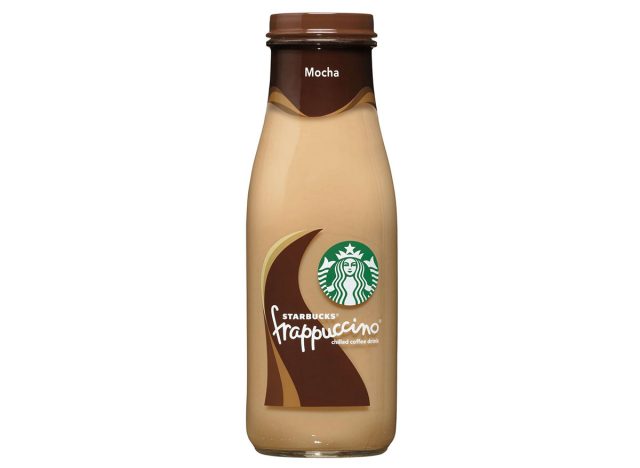
Calories: 270
Fat: 4.5g (Saturated fat: 3g)
Sodium: 140 mg
Carbs: 48g (Fiber:0 g , Sugar: 46g)
Protein: 10g
There’s no denying that a Starbucks Frappuccino is one of the most delicious sweet coffees, but for those who rely on it often for a pick me up, Sabat suggests finding a new coffee drink.
“Starbucks Bottled Frappuccino Mocha is essentially a sugar-laden dessert disguised as a coffee beverage,” she says. “With a staggering 46 grams of sugar—32 grams of which are added—it delivers more sugar than a typical can of soda, spiking blood glucose and promoting insulin resistance, inflammation, and fat storage.”
Sabat explains, “Although it contains brewed coffee and reduced-fat milk, the lack of fiber, high sugar content, and added cocoa contribute to an energy crash rather than sustained fuel. The inclusion of pectin as a thickener does little to offset the drink’s nutritional downsides. Despite its protein content, this drink is not a health-conscious coffee choice, especially when consumed regularly.”
Arizona Green Tea with Ginseng and Honey
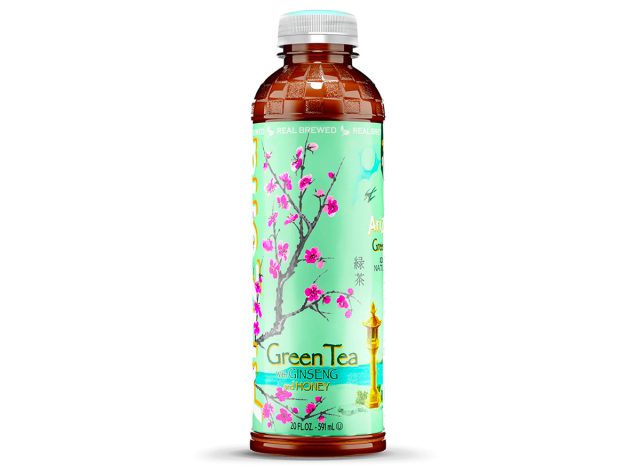
Calories: 260
Fat: 0g (Saturated fat: 0g)
Sodium: 20mg
Carbs: 68g (Fiber: 0g , Sugar: 68g)
Protein: 0g
Arizona Green Tea with Ginseng and Honey has a lot of fans who drink the tea daily, but you’re consuming two to three days worth of sugar in one drink.
According to Sabat, “Arizona Green Tea with Ginseng and Honey is often mistaken for a healthy option due to its green tea base and added ginseng, but in reality, it’s closer to a sugary soft drink.”
She says, “The first major ingredient after water is high fructose corn syrup, a processed sweetener strongly linked to obesity, insulin resistance, and fatty liver disease. Even worse, the 130 calories and 34 grams of sugar reflect only half the bottle—meaning a full 23-ounce bottle delivers 68 grams of sugar, far exceeding daily recommended limits.”
Sabat adds, “While it contains a touch of honey and vitamin C, the tiny amount of ginseng and trace natural flavoring don’t make up for the harmful effects of its sugar load. What should be a light, antioxidant-rich tea ends up functioning more like a dessert in disguise.”
Core Power Protein Shakes
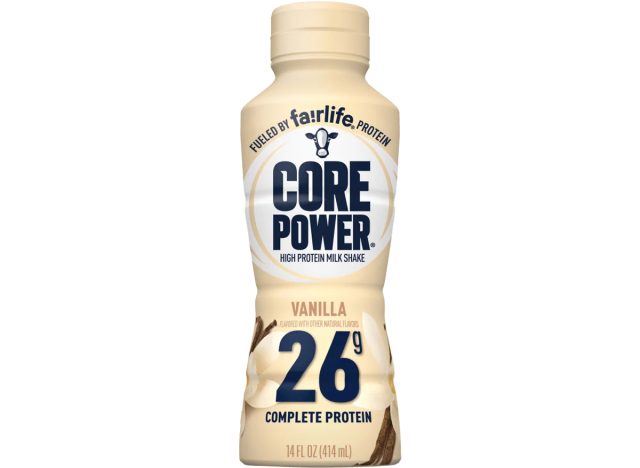
Calories: 170
Fat: 4.5g (Saturated fat: 3g)
Sodium: 190 mg
Carbs: 14g (Fiber: 0g , Sugar: 12g)
Protein: 26 g
The No. 1 unhealthiest bottled drink, according to Sabat, is Core Power Protein Shakes. They are a go-to for many after a workout, or to boost their protein intake, but Sabat says these drinks are highly problematic.
“I put these first because they are so highly marketed as a great source of protein and a healthy food when in reality they are a disaster to your metabolic health,” Sabat says. “Core Power Protein Shakes may seem like a convenient post-workout drink, but a closer look at the ingredients reveals several health concerns.”
She explains, “They use non-organic, conventional dairy, which often comes from cows fed GMO corn and soy and may contain residues of hormones and antibiotics—unlike grass-fed dairy, which is higher in omega-3s and CLA and free from harmful residues. The addition of carrageenan, a thickening agent linked to gut inflammation and irritation, further detracts from its health profile.”
Sabat also points out other harmful ingredients.
“Artificial sweeteners like sucralose and acesulfame potassium are also used, both of which have been associated with gut microbiome disruption and potential carcinogenic effects in animal studies,” she says
Sabat adds, “Lastly, the label includes “natural flavors,” a term that can encompass up to 100 different undisclosed chemical additives, many of which are far from natural. Together, these ingredients make Core Power far less healthy than its marketing implies”.